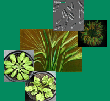| Pischke, E; Barozzi, F; Colina Blanco, A; Kerl, C; Planer-Friedrich, B; Clemens, S: Dimethylmonothioarsenate (DMMTA) is highly toxic for plants and readily translocated to shoots., Environmental Science & Technology (2022), doi:10.1021/acs.est.2c01206 | |
| Abstract: Arsenic is one of the most relevant environmental pollutants and human health threats. Several arsenic species occur in soil pore waters. Recently, it was discovered that these include inorganic and organic thioarsenates. Among the latter, dimethylmonothioarsenate (DMMTA) is of particular concern because in mammalian cells, its toxicity was found to exceed even that of arsenite. We investigated DMMTA toxicity for plants in experiments with Arabidopsis thaliana and indeed observed stronger growth inhibition than with arsenite. DMMTA caused a specific, localized deformation of root epidermal cells. Toxicity mechanisms apparently differ from those of arsenite since no accumulation of reactive oxygen species was observed in DMMTA-exposed root tips. Also, there was no contribution of the phytochelatin pathway to the DMMTA detoxification as indicated by exposure experiments with respective mutants and thiol profiling. RNA-seq analysis found strong transcriptome changes dominated by stress-responsive genes. DMMTA was taken up more efficiently than the methylated oxyarsenate dimethylarsenate and highly mobile within plants as revealed by speciation analysis. Shoots showed clear indications of DMMTA toxicity such as anthocyanin accumulation and a decrease in chlorophyll and carotenoid levels. The toxicity and efficient translocation of DMMTA within plants raise important food safety issues. |

Letzte Änderung 01.12.2022

